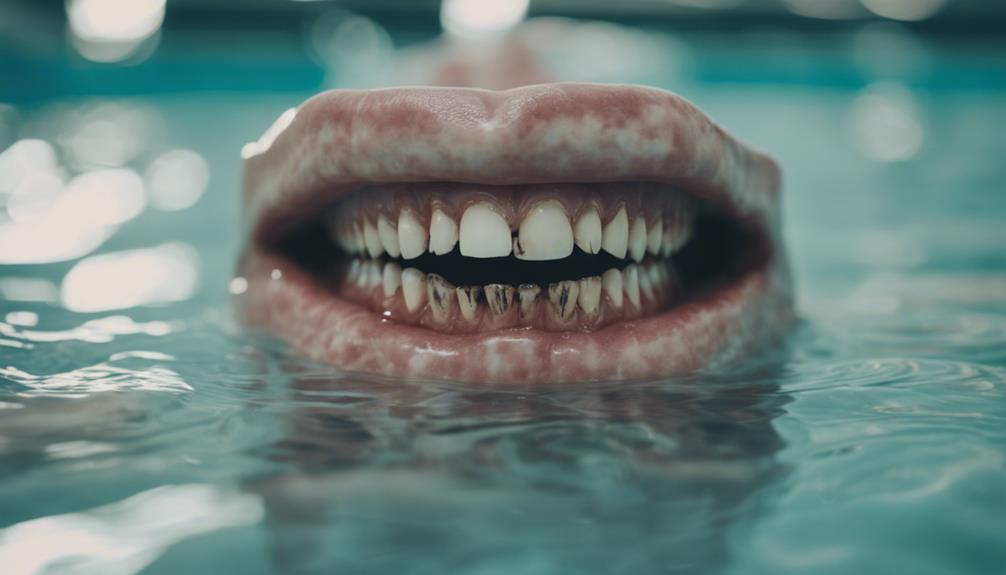Swimming pool water can have a negative impact on your teeth, all thanks to chlorine! The chlorine can weaken your enamel, leading to sensitivity and discoloration. Staining from pool water, also known as swimmers calculus, can also be a issue. To protect your teeth, make sure to rinse your mouth after swimming and use fluoride toothpaste. Try to limit your time in chlorinated pools, and avoid brushing your teeth immediately after swimming. If you experience increased sensitivity, consider using fluoride mouthwash and visit a dentist if necessary. Keep your teeth healthy and stay tuned for more tooth-friendly tips! 😁🦷
Key Takeaways
- Chlorine in pool water can cause enamel erosion and tooth sensitivity.
- Staining from chlorine, known as swimmers calculus, can discolor teeth.
- Rinse mouth post-swim, use fluoride products, and limit pool time to prevent damage.
- Seek dental help for persistent tooth sensitivity caused by pool water exposure.
- Regular dental checkups are vital to detect and address chlorine-induced enamel damage.
The Impact of Chlorine on Enamel
When swimming in chlorinated pools, the impact of chlorine on enamel can lead to tooth sensitivity and discoloration. Yup, that's right! Chlorine, the stuff that keeps the water clean, can actually cause some trouble for your teeth.
See, chlorine in swimming pools can mess with the enamel on your teeth, making them sensitive and even changing their color. Plus, if the pH levels in the pool water are too high, it can speed up enamel erosion and make your teeth more prone to damage.
Not cool, right?
Staining Effects of Pool Water
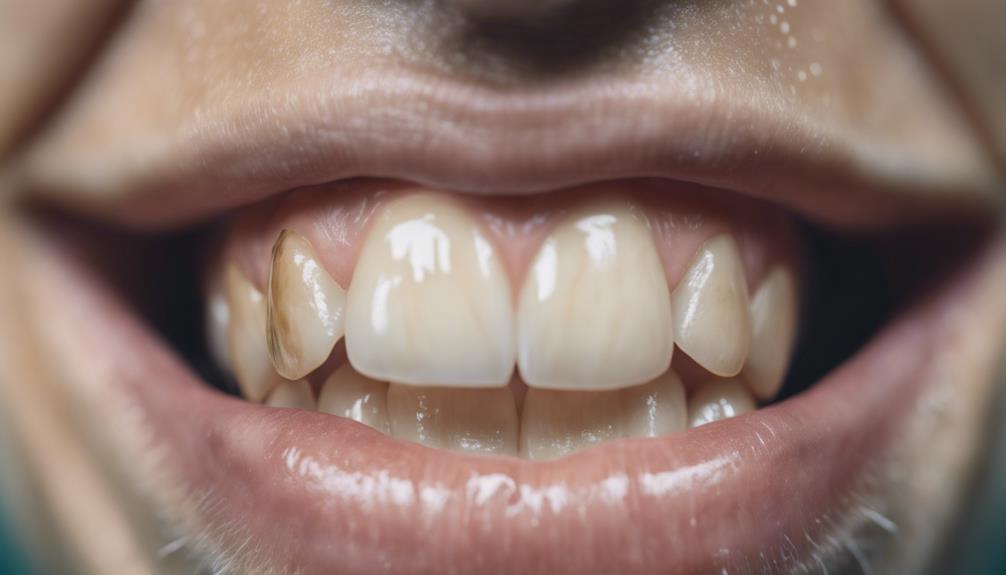
Exposure to chlorinated pool water can result in staining effects on your teeth, commonly known as swimmers calculus. When you spend a lot of time swimming in chlorinated pools, the chlorine can break down your saliva proteins, leading to those unsightly stains on your teeth.
These stains can show up on the build-up of plaque and tartar, making your smile look not as invigorating as you'd like. To protect your teeth from this chlorine damage, it's a good idea to swim with your mouth closed as much as possible. Keeping those pearly whites safe is key to maintaining your dental health while enjoying a revitalizing swim.
Preventing Enamel Erosion
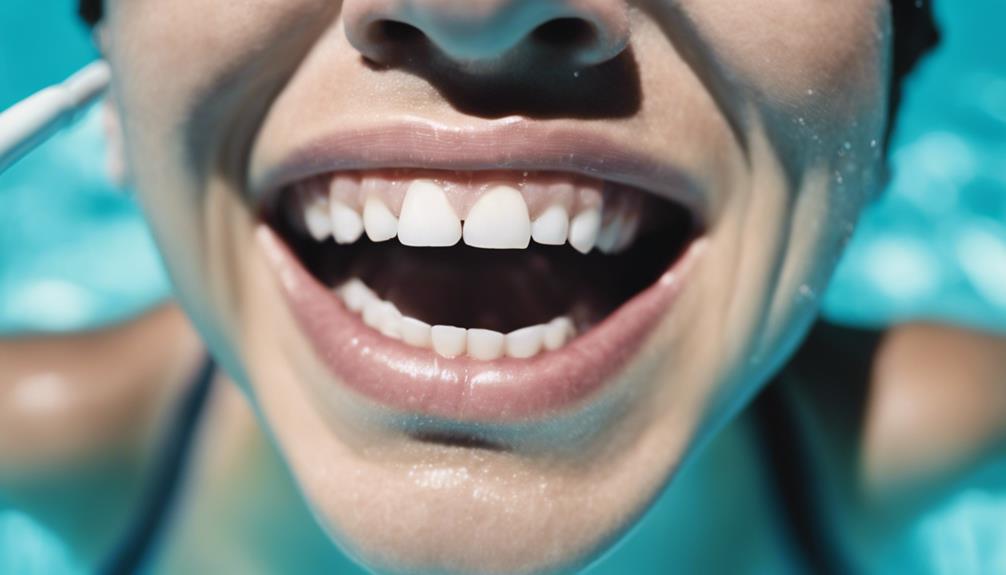
Want to keep your pearly whites shining bright after a swim? Here are some enamel protection tips to help you out.
Avoid acidic substances that can wear down your enamel, and remember to use fluoride toothpaste and mouthwash for extra defense against chlorine exposure.
Your smile will thank you for taking these simple preventive measures!
Enamel Protection Tips
Protect your enamel from erosion with these essential tips. After swimming, make it a habit to rinse your mouth with regular water to wash away chlorine residue that could harm your teeth. Using fluoride toothpaste can help strengthen your enamel and counteract the effects of chlorine exposure. Remember to limit your time in chlorinated pools and maintain good oral hygiene practices to prevent enamel erosion. It's also wise to avoid brushing your teeth immediately after swimming to protect the softened enamel from potential damage. Keep an eye on the pH balance of pools you swim in to avoid acidic water that could contribute to enamel erosion.
| Enamel Protection Tips |
|---|
| 1. Rinse mouth with water after swimming |
| 2. Use fluoride toothpaste |
| 3. Limit exposure to chlorinated water |
| 4. Monitor pool pH balance |
Acidic Substance Avoidance
To prevent enamel erosion caused by acidic substances like chlorinated pool water, it's important to be mindful of the pH levels in the water you swim in. Enamel, the protective layer of your teeth, can be damaged by low pH levels in pool water, leading to enamel erosion.
When swimming in chlorinated pools, try to keep your mouth closed to minimize exposure to the acidic water. After swimming, make sure to practice good oral hygiene by brushing your teeth with fluoride toothpaste and rinsing your mouth with regular water.
If you notice any signs of enamel damage, such as increased tooth sensitivity, it's crucial to schedule a dental check-up. Additionally, if you swim regularly in a local pool, consider discussing the pH balance of the water with the pool maintenance staff to guarantee it's properly regulated to prevent enamel erosion.
Taking these simple steps can help protect your tooth enamel and keep your smile healthy.
Addressing Tooth Sensitivity
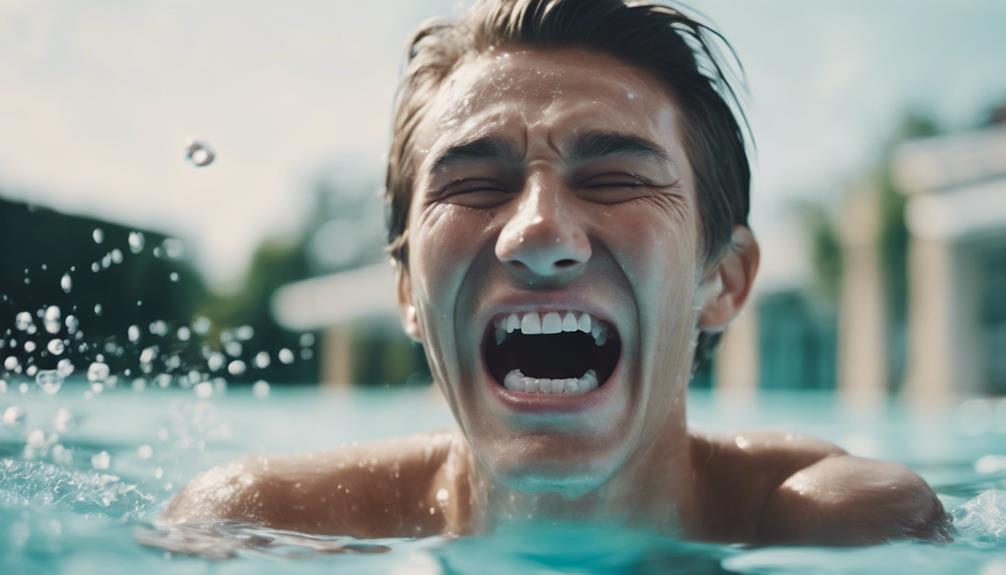
If you are experiencing tooth sensitivity from chlorine exposure in swimming pool water, there are effective ways to address this issue. When chlorine erodes your enamel, it can make your teeth feel sensitive, especially to hot and cold temperatures. It might even cause discomfort when you eat acidic or sugary foods. To combat this, maintaining the proper pH balance in pool water is essential. Here's a handy table to guide you on addressing tooth sensitivity:
| Ways to Address Tooth Sensitivity |
|---|
| Rinse mouth with water after swimming |
| Use fluoride toothpaste for enamel protection |
| Consider a fluoride mouthwash |
| Visit your dentist if sensitivity persists |
| Maintain good oral hygiene habits |
Maintaining Oral Health Post-Swim
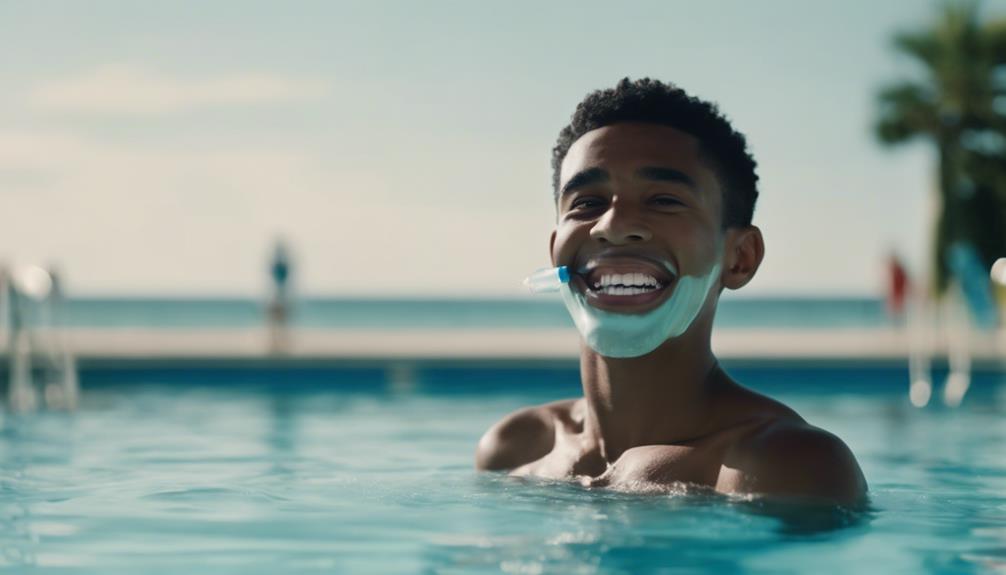
After swimming in a chlorinated pool, it's important to take steps to maintain your oral health to prevent potential damage from chlorine exposure. Here are some easy tips to keep your teeth healthy post-swim:
- Rinse your mouth with regular water to restore pH levels and reduce chlorine exposure.
- Use fluoride toothpaste and mouthwash to strengthen enamel and counteract chlorine damage.
- Keep your mouth closed while swimming to limit chlorine exposure and practice good oral hygiene.
- Check pool pH levels with test strips regularly to maintain proper balance and prevent enamel erosion.
Importance of Regular Dental Checkups
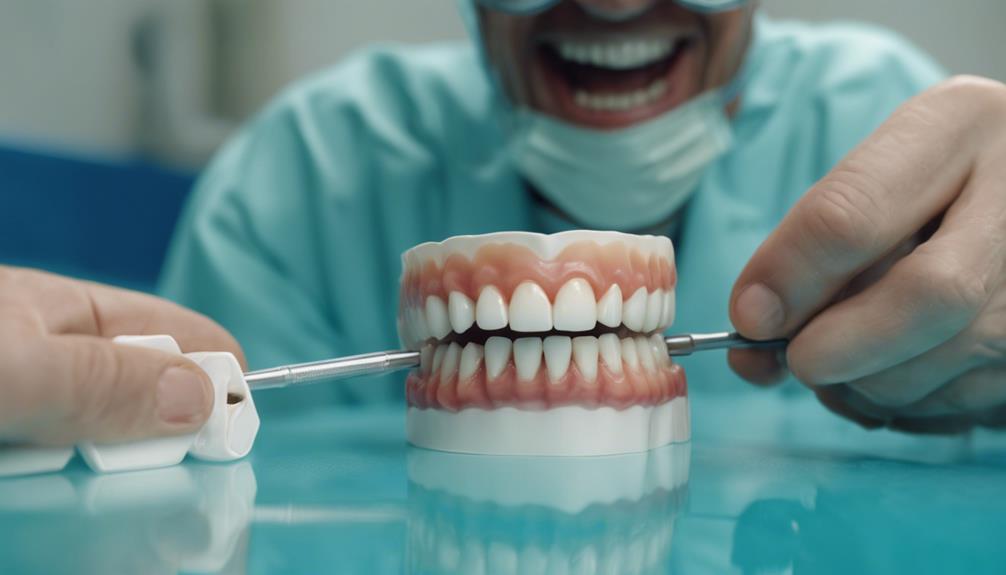
Regular dental checkups play an essential role in safeguarding your oral health, especially in addressing any potential damage that may arise from exposure to swimming pool water. When you take a dip in a chlorinated pool, the pH balance can affect your mouth, leading to enamel erosion.
By visiting your dentist regularly, you can catch early signs of enamel erosion and prevent further damage. These checkups aren't just about fixing problems but also about maintaining good oral hygiene. Your dentist can give personalized advice on how to protect your teeth while enjoying the pool.
Professional cleanings during these visits can also help remove any plaque buildup caused by chlorine exposure. Consistent dental checkups are vital, especially if you're a regular at the pool. So, make sure to schedule those appointments to keep your smile healthy and bright, even after all those pool parties!
Frequently Asked Questions
Is Pool Water Bad for Teeth?
So, you're wondering if pool water is bad for your teeth, right?
Well, here's the deal – chlorine in pool water can actually erode your tooth enamel, especially if the pH levels are too high.
If the pool water isn't balanced right, it can cause enamel loss, leading to sensitivity and dark stains on your teeth.
To keep your pearly whites safe, make sure the pool water pH levels are in check and follow CDC recommendations.
How to Protect Teeth From Pool Water?
To protect your teeth from pool water, it's like shielding a treasure chest from a storm! Check pool pH levels regularly and brush with fluoride toothpaste.
After swimming, rinse your mouth with regular water to wash away chlorine. Limit time in chlorinated water and practice good oral hygiene.
Your pearly whites will thank you for keeping them safe from enamel erosion and sensitivity.
Is It OK to Get Pool Water in Your Mouth?
It's totally fine to get a bit of pool water in your mouth while swimming. Just make sure not to gulp down a ton of it, especially if it tastes like a chlorine smoothie!
Rinsing your mouth with regular water afterward can help wash away any lingering pool water and keep your teeth happy.
What Is Swimmers Teeth?
Swimmers teeth, buddy, that's when your pearly whites take a hit from too much chlorine in pool water. It can mess with your enamel, making your teeth sensitive and discolored.
If the pool's pH levels are out of whack, it's like a double whammy for your chompers. So, rinse your mouth after swimming and use toothpaste with fluoride to keep those teeth shining bright.
And yeah, regular check-ups are a must to stay on top of it!
Can Swimming Pool Water Cause Damage to Teeth Similar to How It Can Transmit Lice?
Swimming pool water does not cause damage to teeth similar to lice transmission in swimming pools. However, factors like chlorine levels and pH balance can affect dental health. It’s crucial to maintain proper pool water hygiene to avoid potential harm to teeth and overall health.
Conclusion
So, next time you take a dip in the pool, remember to rinse your mouth with fresh water afterward to protect your pearly whites. Your dentist will thank you, and your smile will shine brighter than ever.
Stay on top of your oral health and keep swimming with confidence!

